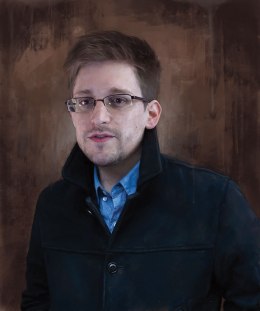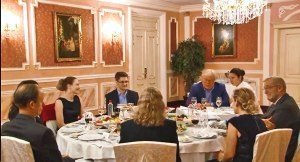
To avoid surveillance, the first four Americans to visit Edward Snowden in Moscow carried no cell phones or laptops. They flew coach on Delta from Washington with tickets paid for by Dutch computer hackers. After checking into a preselected hotel not far from Red Square, they waited for a van to pick them up for dinner.
None could retrace the ride that followed, driven by anonymous Russian security men, nor could any place the side door of the building where the trip ended. They passed through two cavernous ballrooms, the second with a painted ceiling like the Sistine Chapel, and emerged into a smaller space with salmon-colored walls and oil paintings in golden frames—like Alice in Wonderland, remembers one of the group. There at the bottom of the rabbit hole, in rimless glasses, a black suit and blue shirt with two open buttons at the collar, stood the 30-year-old computer whiz who had just committed the most spectacular heist in the history of spycraft.
By all accounts, Snowden was delighted to see his countrymen, though over the next six hours he did not partake of the wine. At one point, Ray McGovern, a former CIA analyst, recited from memory in Russian an Alexander Pushkin poem, “The Prisoner,” which he had learned back in his days spying on the Soviet Union. “We have nothing to lose except everything, so let us go ahead,” said Jesselyn Radack, a former Justice Department attorney, quoting Albert Camus’s warning at the dawn of the nuclear age. Another attendee, the whistle-blowing FBI agent Coleen Rowley, compared Snowden to Benjamin Franklin, who as postmaster general in 1773 helped leak letters from American officials who were secretly collaborating with British authorities.
Even Snowden’s Russian lawyer, Anatoly Kucherena, raised his glass for a toast. Coming from a man with close ties to the Kremlin and a knack for misleading the press, Kucherena’s words captured the surreal nature of Snowden’s Moscow exile. “Ed, I am going to give you the biggest gift that I can probably give,” he told Snowden through an interpreter. “I’m writing a novel about you.”
The gathering had been called to deliver an award, given by four dissident veterans of the U.S. national-security apparatus to one of their own. But for Snowden it was something more, a chance to reaffirm to the world the purpose of his actions, for which he has been charged in absentia with theft and violations of the Espionage Act. Since escaping his country in late May with tens of thousands of its most secret documents—“one of everything,” jokes one person with access to the stash—Snowden has chosen to lie low. No Twitter account. No television interviews. No direct contacts with U.S. authorities. He held his tongue as Kucherena boasted to the press about Snowden’s new Internet job in Moscow, his new Russian girlfriend and his dire money troubles. Most of that is fiction, like the novel, according to several people who communicate regularly with Snowden.
But he has nonetheless begun to figure out a life for himself in Russia, where he has been granted asylum for at least one year. He is learning Russian, recently read Fyodor Dostoyevsky’s Crime and Punishment and spent weeks living with his WikiLeaks protector, Sarah Harrison, who has since flown to Berlin, fearing that she could face criminal charges if she returns to her native Britain. Most important, he has been able to spend time on the Internet, his lifelong home, where he has watched through encrypted and anonymized connections as his leaks roil the world—diplomatic crises, congressional reform efforts, new federal lawsuits, financial damage to U.S. technology companies and an as yet uncertain harm to U.S. national interests, including documented changes in the way terrorists communicate online. “This increases the probability that a terrorist attack will get through,” says General Keith Alexander, the director of the National Security Agency (NSA). “I think it’s absolutely wrong.”
For Snowden, those impacts are but a means to a different end. He didn’t give up his freedom to tip off German Chancellor Angela Merkel about the American snoops on her cell phone or to detail the ways the NSA electronically records jihadi porn-watching habits. He wanted to issue a warning to the world, and he believed that revealing the classified information at his fingertips was the way to do it. His gambit has so far proved more successful than he reasonably could have hoped—he is alive, not in prison, and six months on, his documents still make headlines daily—but his work is not done, and his fate is far from certain. So in early October, he invited to Moscow some supporters who wanted to give him an award.

Snowden received the Sam Adams Associates for Integrity in Intelligence award in Moscow in October.
After the toasts, some photographs and a brief ceremony, Snowden sat back down at the table, spread with a Russian buffet, to describe once again the dystopian landscape he believes is unfolding inside the classified computer networks on which he worked as a contractor. Here was a place that collected enormous amounts of information on regular citizens as a precaution, a place where U.S. law and policy did not recognize the right to privacy of foreigners operating outside the country, a place where he believed the basic freedoms of modern democratic states—“to speak and to think and to live and be creative, to have relationships and to associate freely”—were under threat.
“There is a far cry between legal programs, legitimate spying, legitimate law enforcement—where it is targeted, it’s based on reasonable suspicion, individualized suspicion and warranted action—and the sort of dragnet mass surveillance that puts entire populations under a sort of an eye and sees everything, even when it is not needed,” Snowden told his colleagues. “This is about a trend in the relationship between the governing and governed in America.”

